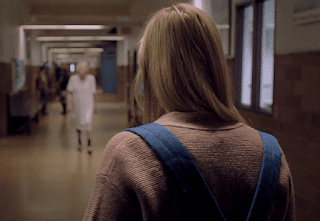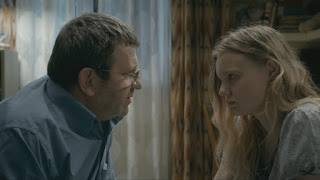American teens getting stalked by a malevolent demonic force is hardly new terrain. It Follows is raised above the genre average to a great extent by its obvious influences: Cronenberg for the longueurs and determinedly unphotogenic cast and settings, Carpenter for the soundtrack, and auteurs quite outside the horror genre for techniques such as knowing when to do away with dialogue and elisions in the narrative. The plot itself, which is to do with the key character being slain by a shuffling, motiveless entity unless they pass on the curse through sex, is pretty cursory and playing once again on the guilt-ridden American relationship to the sexual act, but at times it does allude to that paranoia in a wider societal sense, which few horror films have any interest in.
6/10
Monday, 18 September 2017
Bacalaureat (Cristian Mungiu, 2016)
The third feature by Mungiu, director of the acclaimed 4 Months, 3 Weeks and 2 Days, which was centred around an illegal abortion in Communist Romania, Graduation tackles equally serious social themes as a girl is raped the day before her high-school finals. This jeopardises her chances of qualifying for her scholarship at a university in England and her father decides to take control of matters, going behind her back to influence the examination officials.
His motives are convoluted: we see that he's far more concerned with getting his daughter out of a place that he repeatedly tells her she does not have a future in than with the inconvenience of what has happened to her. We see more of his emotional reaction to the incident than we do of hers; he's emasculated by it and, as with the balancing act he has between his wife and his mistress, more concerned with being seen to do the right thing than actually taking the wishes of others into account.
Likewise, Romanian society is depicted as a hopeless tangle: it subsists on backroom deals, back-scratching and outright bribery, and if the director is being excessively pessimistic in his view, it's a very convincing picture all the same. Nothing is morally clear-cut, and there is correspondingly no tidy dramatic conclusion either. It's one of those films that raises questions that linger on, and while it could have benefited from a more cinematic sensibility to add contrast, it is nevertheless a satisfyingly adult piece of film-making.
7/10
His motives are convoluted: we see that he's far more concerned with getting his daughter out of a place that he repeatedly tells her she does not have a future in than with the inconvenience of what has happened to her. We see more of his emotional reaction to the incident than we do of hers; he's emasculated by it and, as with the balancing act he has between his wife and his mistress, more concerned with being seen to do the right thing than actually taking the wishes of others into account.
Likewise, Romanian society is depicted as a hopeless tangle: it subsists on backroom deals, back-scratching and outright bribery, and if the director is being excessively pessimistic in his view, it's a very convincing picture all the same. Nothing is morally clear-cut, and there is correspondingly no tidy dramatic conclusion either. It's one of those films that raises questions that linger on, and while it could have benefited from a more cinematic sensibility to add contrast, it is nevertheless a satisfyingly adult piece of film-making.
7/10
Saturday, 16 September 2017
Me and Earl and the Dying Girl (Alfonso Gomez-Rejon, 2015)
A socially awkward high school kid with a passion for movies is forced by his mum to befriend a girl with leukaemia, something that then turns into a real platonic relationship. We are very much in American independent Dave Eggers/Michel Gondry country here, with the quirkiness laid on thick just so we know how magical life can be, and both the lead character's incongruously street black mate and the waning, poetic girl serve rather flimsily as mere foils for the stock self-obsessed white middle-class male in the centre, but it is redeemed overall by having a sparkling sense of wit - evident in the film spoofs that the boys make in particular - and a real emotional sensitivity too, even if it falls quite decisively short of saying anything truly insightful.
6/10
6/10
I.T. (John Moore, 2016)
For an actor who, post-Bond, has been able to demonstrate bags of acting talent and commands the screen too, Pierce Brosnan really does make unwise choices. Here, as a self-satisfied aviation tycoon who inadvertently upsets a socially dysfunctional employee, it's not that he does anything wrong per se in the role, just that the role is shallow and so's the psycho stalker plot that we're then plunged into without much further ado. Then it's just a matter of joining up the dots, while wondering what on earth I.T. really has anything to do with it, besides the looney utilising technology as his torture instrument of choice.
4/10
4/10
John Wick: Chapter 2 (Chad Stahelski, 2017)
This is a rarity in the world of action sequels in that it's actually superior to the first instalment. Unfortunately, since the first film was almost entirely an exercise in monitoring the body count, with only a cursory origin story serving as a respite, this is not high praise. Keanu Reeves has slowed down noticeably in dutifully wading through more and more disposable thugs and it isn't a pretty sight for Neo: jowlier does not always equal more grizzled, and he's always been an actor heavily dependent on how he comes across visually in the absence of any greater talent. It covers its Ronseal non-stop violence remit and finishes open-endedly with Wick even worse off than before, and that is pretty much the sum total of its virtues.
5/10
5/10
Death Note (Adam Wingard, 2017)
Hollywood's ransacking of Japanese horror manga continues with a wholly unnecessary loose remake of the first of the live-action versions of the story. The story essentially involves a high school student who comes across a notebook which causes the death of anyone known to the writer whose name is written in it. He begins by offing just truly evil people and then predictably loses focus. It's a premise with legs, explaining why it has gone on for so long in Japan, and the death god Ryuk who periodically visits the hapless protagonist to taunt and cajole him is an unsettlingly opaque presence: having Willem Dafoe voice the character was probably the best decision made in this adaptation. On the other hand, focusing excessively on the sulky teenage lead instead of his more interesting demonic tormentor, adding a spurious love interest and cramming in as much as possible from the source material in case the U.S. franchise doesn't take off do it no favours at all.
4/10
4/10
Subscribe to:
Comments (Atom)





